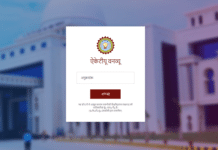When one says the word ‘History’, what comes to your head? Mughals, Akbar, and questions like ‘Akbar ke baap ka beta kaun tha’. Yes, every History major is asked that question at some point of time. But we’ll tell you how history is much much more than just Mughals and wars.
So, you’re saying History is a course with substance?
History is predominantly perceived as an underdog subject, hiding under the wings of subjects like Political Science, or English, which are considered more popular and more ‘worthy’ of taking. Most people find history boring in school, and hence don’t consider taking it up as a major in college. Well, being a History major myself, I’ll tell you exactly why you should consider taking up history as a major in college. Nobody can force your choices however, but here are a few things that you might want to know about history before you think of dismissing it altogether.
Please tell me it isn’t entirely boring and sleep-inducing!
This is the right time to clear myths surrounding the subject, such as History being eternally boring, having never ending answers, unlimited readings and sources to study from. Just kidding. All of the above are absolutely true, except of course the fact that it is a boring course. There are various aspects of history that are covered in the minutest details in college, including all time periods. However myths such as ‘history doesn’t have any scope in the future’, or ‘one cannot have a career after getting a major in history or probably a masters degree’, are absolutely untrue. History might not be as widely popular as other humanities subject as a college major, but is definitely an upcoming subject with various job opportunities and career options available after pursuing majors in history as well.
So do I need to be the nerd who aces the art of rote-memorization?
The kind of aptitude required for History is basic. One should have basic aptitude for the subject, a general understanding of humanities and a knack for history in particular, an ability to rote-learn to an extent and hence basic memory, ability to write long essay-type answers and ability to remember dates, events and chronology.
Coming to what history essentially comprises of as a major in college, it is quite different from what you might except when you first take up the course. However that might as well be true for any other major you take up in college. History taught to us in school is completely different from how it is taught to us in college. You wouldn’t have a prescribed book which has 10 chapters with 10 different themes that you need to cover for the exam like in school. Here in college, every subject has multiple themes and each theme and sub-theme has different ‘readings’, or different books/chapters/articles written by different scholars and historians. So throughout the three year course, history offers the study of a different time period in every semester, the time period being progressive. So for example, we have a subject called Social Formations in Semester 1 which covers evolutionary history, so next semester would cover the world history of the time period that comes after that. Hence first year has predominant core subjects such as Social Formations and Ancient India, second year brings subjects like Early Medieval, Later Medieval and Modern West, followed by Mughal and Modern India in the fourth semester. Hence every semester covers a progressive time period in terms of both Indian and World history. Since everything is covered, every student eventually finds their favourite part in one subject or the other.
Hear what the current students have to say! They have been there, done that!
One perspective to things is never enough(as we are always taught in History), hence these are a few things said by students pursuing history as their major in college. Both positive as well as negative aspects of the subject have been highlighted by them.
A major in History isn’t about learning vivid chronologies and historiography, but relating it to your environment and society. The subject deciphers the background and origin of everything that affects my surrounding. It makes you more aware and have a reasoned understanding of your social formation. However History is upon interpretation, therefore, it requires an imperative effort to work out an unbiased approach to the Origins
- Saptaparno ( 2nd year) SGTB Khalsa College, Delhi University
The one thing that I find a little problematic is that after BA(honours) History, one gets comparatively less industry exposure to other subjects, like for example economics. This makes us comparatively less aware of the career oppourtunities and professions we could pursue after MA/MPhil History and hence that only usually leads to a career in academics and research. However as a discipline, it is amazing to study and has never failed to grab my interest.
- Vidisha (2nd year) Miranda House, Delhi University
We also asked one of our professors from DU about what he thinks about history as a course in general. He said,
Amongst all courses, history is both the most comprehensive and the most objective. owing to the temporal distance between the student and the object of study. This allows a student to develop objective analytic tools to study social reality without bringing in his or her own ideological biases. Also the emphasis on the corroboration of arguments with sources is most pronounced of the discipline of history.
- Professor, Department of History, Miranda House, Delhi University
Looks good, except, will I be able to make a career out of this?
Coming to career options available after History, these are varied. Various new job prospects related or unrelated to history have sprung up in recent years, which may be pursued after doing your graduation in history. Unlike engineering, education, accounting, management, journalism, nursing, or other undergraduate professional degrees, there is no single, clear career track into which most graduating history majors go and find employment after receiving their bachelor’s degree. One can take up International Relations (in which history benefits) as a masters course, and then either go into research, or prepare for UPSC, or try for government jobs, or try for jobs in the United Nations. You can also continue your Masters in History, and either go into research or academics (and probably become a historian!). You may take up Archaeology in your Masters and go on to pursue the same. MA in Archeology is a very sought after course among History graduates. You might also try other unrelated fields, such as MBA or Human Resource Management. You might also become a Conservationist, working towards either restoration of architecture (remember Deepika Padukone from Love Aaj Kal?) or art and paintings. Journalism is also another field that can easily be pursued after a degree in history. You could also take up less known professions such as museum curator, if at all interested.
So what are all you history lovers waiting for? Let’s take up history and change the world in our own little way!
– Columnist, DU Times



















